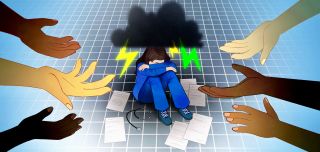Moral Injury
Identifying and Addressing the Hidden Cost of Moral Injury
Healing from transgressions to one's moral framework.
Updated June 2, 2024 Reviewed by Kaja Perina
Key points
- Moral injury extends beyond conflict zones, affecting diverse individuals from healthcare workers to parents.
- Effective healing from moral injury involves sharing burdens and collectively embracing human stories.
- Acceptance and Commitment Therapy shows promise in facilitating healing through forgiveness and acceptance.
- A systemic approach to foster psychologically safe environments can help prevent ongoing trauma.
Moral injury arises from exposure to situations that profoundly conflict with one's ethical or moral beliefs, often experienced through actions, decisions, or witnessed events that transgress one's moral framework. Although not classified as a mental illness, unaddressed moral injury can lead to severe psychological distress, contributing significantly to conditions such as anxiety, depression, and PTSD. This article explores the effects of moral injury on individuals across various professions, and effective strategies for addressing and healing from these invisible wounds.
Impact and Prevalence
Health practitioners frequently experience physician burnout or compassion fatigue due to their relentless exposure to complex decisions in the face of limited resources and moral ambiguity. These practitioners also experience higher levels of moral injury, with a suicide rate that is more than twice that of the general population each year.
The British Medical Association (BMA) recently surveyed UK doctors who indicated moral distress resonated with their work experiences, with 78.4% reporting moral distress, and 51.1% reporting moral injury. Making difficult decisions without support can exacerbate moral distress, which has been associated with serious mental health issues.
Broader Demographics Affected
Moral injury was originally associated with military personnel, yet extends far beyond the battlefield to all of us—parents, teachers, leaders, lawyers, clergy, elite sportspeople, healthcare providers, and justice workers who daily navigate the complexities of moral decision-making. Evidence suggests that moral injury occurs in childhood adversity that leads to negative mental health outcomes as adults, particularly with trauma-related pathologies such as PTSD and depression.
Recognising Moral Injury

Moral injury manifests through an array of emotions, including guilt, shame, and regret stemming from perceived moral failings, and self-blame. Yet, despite its profound impact, moral injury often remains overlooked, overshadowed by more visible symptoms of PTSD in medical care.
Understanding the link between moral injury and mental health, particularly in trauma-related outcomes such as PTSD and depression, is important for front-line workers such as police, paramedics, firefighters, and all health professions to treat trauma. Morally conflicting experiences may facilitate the effects of trauma, so exploring the role of moral injury in influencing them is important.
Real World Applications and Healing Approaches
Effectively addressing moral injury begins with recognizing the power of listening and acknowledgement in the healing process. Many find that simply having their suffering heard and validated is a crucial step towards recovery. Active listening, a transformative act, underscores the importance of genuinely engaging with individuals' experiences.
As Michael W. Purdy notes, "Listening is the artful practice of caring for human beings, and how well we listen is a measure of how civilised we have become." Moral injury, such as aversive emotions and thoughts, are not only natural but also crucial for the functioning of successful societies. But if they remain unresolved, problems arise. Tending to our inner turmoil and discomfort, even when rooted in a fear of failure, is essential. Being able to accept and experience painful emotions such as shame makes it possible to sit with our own suffering and avoid becoming disconnected from ourselves and others.
A lack of social support, negative thought patterns, and struggles with meaning-making can also exacerbate the persistence of moral injury. Conversely, cultivating self-compassion, receiving mental health education before facing potential traumas, and practicing mindfulness can serve as protective factors, moderating the effects of moral injury.
Acceptance and Commitment Therapy (ACT) has shown promise with the treatment of moral injury and introduces the concept of "creative hopelessness" to help individuals recognize the unproductive nature of trying to avoid internal experiences, encouraging a more accepting and willing approach. This shift enables individuals to redirect their focus towards actions that reflect their true values.
In the healing process, ACT identifies moral pain as a sign of a functioning moral compass, facilitating a transformative reorientation in how individuals relate to themselves, others, and the broader world. Forgiveness plays a pivotal role in this framework. From the perspective of ACT, forgiveness involves a proactive "giving" of what preceded the harm.
This act of forgiveness, whether directed towards oneself or others, acts as a springboard for healing and re-engagement with deeply held values, including those previously compromised by moral conflicts. Clinical researchers have highlighted the importance of interdisciplinary treatment teams, that include pastoral/chaplain care, to address the stigma of seeking help for moral injury.
Systemic Solutions and Future Directions
Moral injury extends its reach far beyond individual experiences, influencing societal structures and systems. Understanding the systemic factors contributing to moral injury—societal pressures, organisational dynamics, and intrapersonal wounding, is vital to developing effective solutions. Cultivating psychologically safe environments and fostering self-compassion are vital in addressing the root causes of moral injury and building resilience.
Though the wounds of moral injury are often invisible, their impact is profound. By fostering connection, compassion, and understanding, and seeking solutions at both personal and systemic levels, we can initiate a journey towards healing and restoration for all affected by moral injury.
References
British Medical Association. Moral distress and moral injury: Recognising and tackling it for UK doctors. https://www.bma.org.uk/media/4209/bma-moral-distress-injury-survey-repo…
Carey, L. B., Hodgson, T. J., Krikheli, L., Soh, R. Y., Armour, A., Singh, … Impiombato, C. G. (2016). Moral injury, spiritual care, and the role of chaplains: An exploratory scoping review of literature and resources. Journal of Religion and Health, 55, 1218–1245. https://doi.org/10.1007/s10943-016-0231-x
Drescher KD, Foy DW, Kelly C, Leshner A, Schutz K, & Litz B (2011). An exploration of the viability and usefulness of the construct of moral injury in war veterans. Traumatology, 17, 8–13. https://doi.org/10.1177/1534765610395615
Koenig HG, Youssef NA, Pearce M. Assessment of Moral Injury in Veterans and Active Duty Military Personnel With PTSD: A Review. Front Psychiatry. 2019 Jun 28;10:443. doi: 10.3389/fpsyt.2019.00443. PMID: 31316405; PMCID: PMC6611155. https://doi.org/10.3389/fpsyt.2019.00443
Kopacz, M. S., Ames, D., & Koenig, H. G. (2019). It's time to talk about physician burnout and moral injury. The Lancet Psychiatry, 6(11), e28. https://www.thelancet.com/pdfs/journals/lanpsy/PIIS2215-0366(19)30385-2.pdf
Kopacz, M. S., Hoffmire, C. A., Morley, S. W., & Vance, C. G. (2015). Using a spiritual distress scale to assess suicide risk in veterans: An exploratory study. Pastoral Psychology, 64, 381–390. https://doi.org/10.1007/s11089-014-0633-1
Litam, S. D. A., & Balkin, R. S. (2021). Moral injury in health-care workers during COVID-19 pandemic. Traumatology, 27(1), 14–19. https://doi.org/10.1037/trm0000290
Meador, K. G., & Nieuwsma, J. A. (2017). Moral injury: Contextualized care. Journal of Medical Humanities, 39, 93–99. https://doi.org/10.1007/s10912-017-9480-2
Morgan, J. K., Hourani, L., Lane, M. E., & Tueller, S. (2016). Help-seeking behaviors among active-duty military personnel: Utilization of chaplains and other mental health service providers. Journal of Health Care Chaplaincy, 22, 102–117. https://doi.org/10.1080/08854726.2016.1171598
Neff, K. D. (2003). Self-Compassion: An Alternative Conceptualization of a Healthy Attitude Toward Oneself. Self and Identity, 2(2), 85–101. https://doi.org/10.1080/15298860309032
Pfeffer, C., Hart, R., Satterthwaite, M., Bryant, R., Knuckey, S., Brown, A. D., & Bonanno, G. A. (2023). Moral injury in human rights advocates. Psychological Trauma: Theory, Research, Practice, and Policy, 15(Suppl 2), S268–S274. https://doi.org/10.1037/tra0001404
Raj, P., Elizabeth, C. S., & Padmakumari, P. (2016). Mental health through forgiveness: Exploring the roots and benefits. Cogent Psychology, 3(1), 1153817. https://doi.org/10.1080/23311908.2016.1153817
Roth, S. L., Andrews, K., Protopopescu, A., Lloyd, C., O'Connor, C., Losier, B. J., ... & McKinnon, M. C. (2022). Mental health symptoms in public safety personnel: examining the effects of adverse childhood experiences and moral injury. Child Abuse & Neglect, 123, 105394.
Shay, J. (1994). Achilles in Vietnam: Combat trauma and the undoing of character. Atheneum Publishers/Macmillan Publishing Co.




